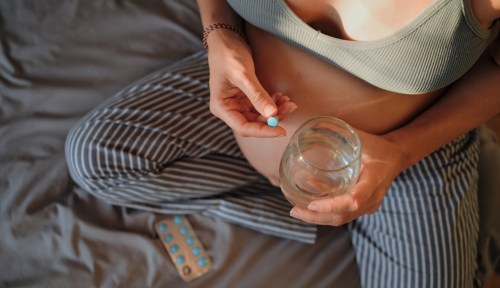The complete guide to skin care for all phases of pregnancy
Here's how to switch up your skin care for pregnancy, plus before and after baby arrives—including the ingredients to avoid and products to try.
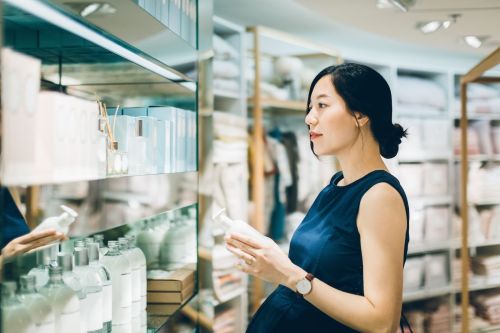
Of the many physical changes that happen during pregnancy, skin isn’t really something that people tend to talk much about. But the truth is, a woman’s complexion can shift pretty drastically during the many phases of baby-making—from the moment she ditches birth control to the postpartum period and everything in between.
And just like a mom-to-be often reinvents her diet, her wardrobe, and her sleep habits to accommodate the tiny guest in her uterus, there’s also something to be said for shaking up the ol’ skin care routine. Why? Well, not only can this help ward off pregnancy-related skin issues before they get out of hand, it can also help ensure that baby’s not exposed to potentially sketchy chemicals that might be lurking in your medicine cabinet. (You can never be too careful, right?)
The first thing to note, says dermatologist Nancy Samolitis, MD, is that there’s no one-size-fits-all regimen for pregnancy. “There are a lot of changes that can occur, but they’re not always predictable,” says Dr. Samolitis, cofounder and medical director of Facile Dermatology + Boutique in Los Angeles. “One person may have a completely different experience than another based on your genetics and other environmental factors.”
Therapeutic Skin Coach Hayley Wood agrees, and she points out that instead of getting frustrated about the shifting state of your skin, you can actually look at your complexion as a source of valuable intel about what’s going on internally. “I don’t look as skin issues as negative, but rather ways that our body can communicate with us,” she says. “If your skin’s response feels depleting or inflamed, it’s just information directing you toward finding a better balance.”
With that in mind, skin experts do have a few recommendations for the most common concerns women face during pregnancy. And remember, it’s not all bad news—that mythic pregnancy glow is, in fact, a very real thing.
Read on for your road map to skin care for pregnancy.
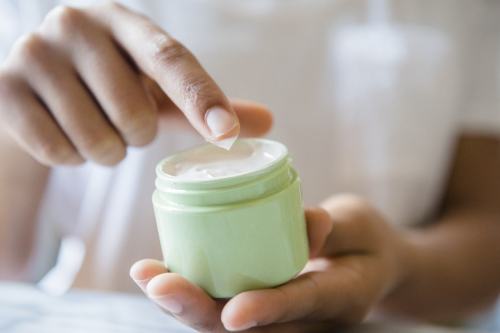
Pre-pregnancy
Prepare for a few breakouts: If you’ve just stopped taking hormonal birth control, you may find that your skin starts freaking out in the form of breakouts. This is pretty normal, says Wood. “The toughest part of going off of birth control is to reconnect with the natural [hormonal] cycles we have as women,” she says. “When women experience breakouts or any other inflammatory skin conditions from coming off of birth control, it’s just because their body is experiencing a bit of a healing crisis and has to learn to regulate certain functions again.” Fertility treatments, too, can sometimes result in increased oiliness and acne, says Dr. Samolitis.
To help bring things back into balance, Wood recommends a combination of gentle, soothing skin care to reduce inflammation (look for ingredients like aloe, rose, and nettle) and lymphatic massage, which can give an assist to your body’s detoxification process.
Clean up your medicine cabinet: Just as pregnant woman are often told to stay away from caffeine and alcohol, there are also certain beauty ingredients that should remain off-limits. “Your skin absorbs everything you put on your body, so it has to be baby-safe,” says Wood. And it’s not just about the nine months of pregnancy, either. “It may be beneficial to start cleaning up your skincare routine as early as six months before you start trying to conceive,” says Raquel Nowak, prenatal health coach and founder of Matrescence skin care. That’s because scientists have pinpointed 180 days as the ideal amount of time to make healthy lifestyle changes before getting pregnant.
The main ingredients to avoid, she says, are salicylic acid, benzoyl peroxide, hydroquinone, and parabens. Dr. Samolitis adds retinoids and tetracycline antibiotics to the list, while Wood recommends her clients avoid peels, microneedling, microcurrent treatments, lasers, and injections, as they can put the skin under unnecessary stress. And you may also want to consider what’s in your products’ packaging. Nowak notes that BPA, which has been linked to reproductive disorders, can leech into products when exposed to heat, so look for potions in glass or BPA-free containers.
I know what you’re probably thinking: Okay, so what can I use? Luckily, there are a number of clean beauty brands creating products that are specifically formulated for the needs of pregnant and nursing moms, including Matrescence and True Botanicals’ Pregnancy Collection.
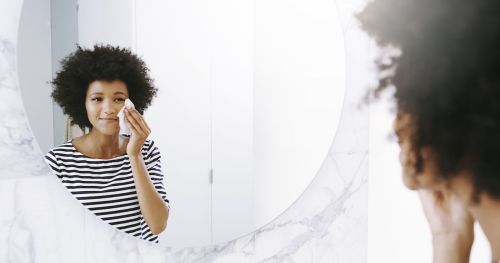
The first trimester
Take a less-is-more approach: As you’ve probably heard from your pregnant friends—or even experienced yourself—the first trimester can be rough. You’re tired all the time, your moods are all over the map, and you’re likely spending a lot more QT with your loo. For this reason, Wood recommends paring back your products to give your skin a break. “If someone is going through a ton of morning sickness, this will deplete the skin so much—the nutrients the skin is used to absorbing from foods and supplements are all needed elsewhere in the body,” she says, noting that breakouts and dehydration can result.
So if you notice your skin isn’t responding to your standby products as it normally does, you may want to shelve them until your body comes back into balance. “It’s important to eliminate ingredients that are potentially sensitizing,” Wood says. “Products that have too many ingredients can overcomplicate the skin’s natural processes, so stick with few products with fewer ingredients. Even if that means you cleanse your skin with an organic jojoba oil for a few months.”
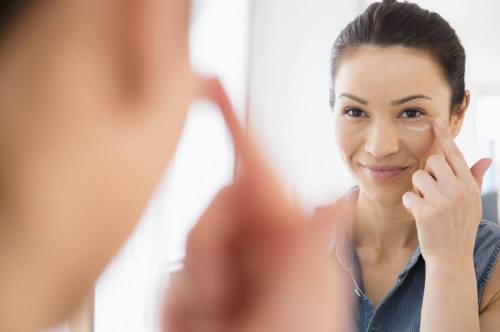
The second trimester
Keep an eye on moles and melasma: If you feel like you’re seeing more (or bigger) dark spots on your face and bod, you’re probably not imagining it. For one thing, brown patches called melasma are common starting in the second trimester and going into the third. “Many women will develop melasma, especially if they have a history of tanning easily,” says Dr. Samolitis. Sun exposure can make things worse, so be even more vigilant about wearing sunscreen. “Using a pure mineral sunscreen, with ingredients like zinc and titanium, is definitely safe,” says the doctor.
You may also notice that your moles are changing—and while Dr. Samolitis says that’s normal, you should definitely keep an eye on them. “It’s important to have a skin exam during pregnancy if you notice that a mole is significantly changing in size or color,” she says. “Pregnancy can also stimulate growth of benign skin lesions such as skin tags or cherry angiomas. These don’t necessarily regress after pregnancy, but can be easily removed with a procedure.”
Prioritize nourishing products: If your first three months of pregnancy were rough, the second trimester may leave you wanting to revitalize your depleted complexion. “This is where vitamin C or hyaluronic acid may [be helpful],” Wood says. You may also be feeling the effects of exhaustion by this point, which can show up in the form of eye puffiness and dark circles. A good eye cream isn’t the only thing that’ll perk you up, says Wood, although it can’t hurt. “In reflexology, the eyes can represent our breasts and ovaries, as well as our lungs, which are changing often during this time. So implementing breath work and lymphatic massage through a gua sha practice can be really supportive as well.”
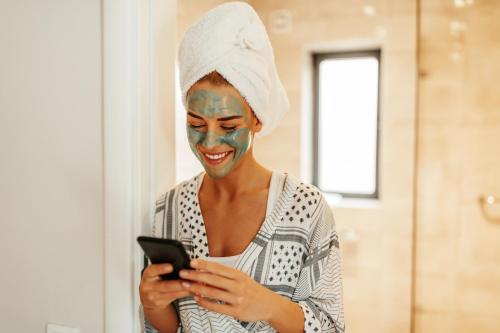
The third trimester
Give yourself as much TLC as possible: Your ankles are swollen, your back hurts, it’s hard to get comfy enough to sleep well—no wonder Wood says you should spring for a spa trip or two in the three months before baby arrives. “Allowing others to come in and support you will be the most important, so go and get a nurturing and calming facial or pregnancy massage,” advises Wood, who’s developed a pregnancy-safe “fertility facial” with Sonäge skin care for this very purpose. “The whole body is changing so rapidly here that slowing down and allowing yourself to rest as much as possible is ideal.”
And you can totally do the home-facial thing, too, says Dr. Samolitis. “Pampering your skin with a simple, hydrating facial or manual exfoliation with a Clarisonic brush is safe to do,” she says. But what products to use? “There are a few ingredients that are effective for taking care of problem skin that are known to be safe, such as azelaic acid and niacinamide. Both have brightening, anti-inflammatory, and anti-aging effects.” May as well play up that prenatal glow while it lasts.

After the baby arrives
Stock up on multitasking products: When you’re sleeping in two-hour increments and your body is recovering from the monumental feat that is childbirth, your skin’s probably gonna tank to the bottom of your priority list. But at the same time, says Dr. Samolitis, many women experience acne during the postnatal period, when their hormones are readjusting.
That’s why products that do the most are key, says Wood. “A calming, yet mineralizing mask like the Tulsi Soothing Tri Clay Mask is a great add-on when you’re taking a shower,” she says. “It can help restore any depletions while eliminating build-up.” And yes, it still works if you’re showering only once a week.
Another skin concern many women have during pregnancy? Stretch marks. Hatch Mama created belly sheet masks to soothe your skin—or you could use these two super-affordable oils, like Hilary Duff.
Sign Up for Our Daily Newsletter
Get all the latest in wellness, trends, food, fitness, beauty, and more delivered right to your inbox.
Got it, you've been added to our email list.

